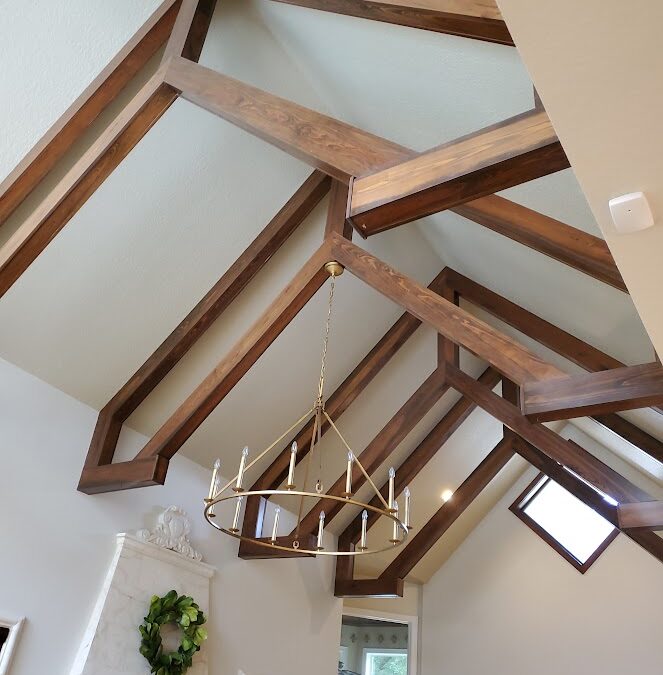Stained Wood vs. Natural Wood Finish: 4 Key Points
Wood is a timeless material cherished for its natural beauty and versatility. Whether you’re considering furniture, flooring, or accents within your home, deciding between stained wood and a natural wood finish can significantly impact the aesthetic and ambiance of your space.
Stained Wood: Enhancing Character and Color
Staining wood involves applying a colored pigment to the surface, enhancing its appearance by altering the natural hue and highlighting its grain. This process allows for a myriad of colors and shades, offering versatility and the ability to match or complement existing decor.
Advantages of Stained Wood:
Color Customization
Staining offers an array of color options, allowing you to achieve a specific hue that aligns with your design vision.
Grain Emphasis
The application of stain often accentuates the natural grain patterns of the wood, adding depth and character to the piece.
Uniformity
Staining helps create a consistent color across different wood types or pieces, ensuring a cohesive look throughout your space.
Protection
Alongside enhancing aesthetics, stains also provide a protective layer against moisture, sunlight, and general wear and tear.
However, achieving the desired color can be a bit of a trial-and-error process, and the final result might differ based on the type of wood used and the application method.
Natural Wood Finish: Embracing Organic Elegance
Opting for a natural wood finish involves showcasing the wood’s original color and texture without altering its appearance significantly. This finish celebrates the raw beauty of the material, letting its natural characteristics take center stage.
Advantages of Natural Wood Finish:
Authenticity
Retaining the wood’s natural appearance preserves its authenticity, showcasing the unique patterns, knots, and textures.
Timelessness
Natural wood finishes tend to exude a timeless appeal, blending seamlessly with various design styles, from rustic to modern.
Low Maintenance
Compared to stained wood, a natural finish might require less maintenance, as it doesn’t involve added layers that could wear over time.
Warmth and Elegance
The raw beauty of natural wood evokes a sense of warmth and elegance, lending a sophisticated charm to any space.
However, without the protection of a stain, the wood might be more susceptible to scratches, discoloration, and damage from environmental factors.
Choosing the Right Option
Deciding between stained wood and a natural wood finish largely depends on personal preferences, design goals, and the intended use of the wood. It’s always best to consult an expert with every project you have in mind. Consider these factors to guide your decision:
Style and Ambiance
Determine the atmosphere you wish to create. Stained wood might suit a more contemporary or customized look, while a natural finish tends to complement rustic or traditional aesthetics.
Practicality
Evaluate the maintenance needs and the level of protection required based on the wood’s purpose. For high-traffic areas or furniture, a stained finish could offer better durability.
Existing Decor
Consider how the wood finish will harmonize with your current decor. Stained wood can either complement or contrast existing colors, while a natural finish might blend seamlessly with various styles.
Ultimately, both stained wood and a natural wood finish hold their allure, each contributing a distinct charm to interior design. Whether you’re drawn to the richness of stained hues or the authenticity of natural wood, both choices allow you to create a space that reflects your individual style and preferences. Understand more about carpentry and remodeling and how it can elevate your carpentry projects.
Related Posts
Leave a Reply Cancel reply
Recent Posts
- 7 Essential Staircase Design Tips for a Perfectly Crafted Staircase
- 8 Seasonal Home Maintenance Tips to Protect and Upgrade Your Home
- 5 Smart Space-Saving Carpentry Ideas That Transform Tight Spaces
- 5 Brilliant Tips for Designing Custom Banquettes That Blend Style and Function
- 5 Reasons Finish Carpentry Prep Caulking and Sanding Make or Break the Final Result
Recent Comments
Archives
- May 2025
- April 2025
- March 2025
- February 2025
- October 2024
- September 2024
- August 2024
- July 2024
- June 2024
- May 2024
- April 2024
- March 2024
- February 2024
- January 2024
- December 2023
- November 2023
- October 2023
- September 2023
- August 2023
- July 2023
- June 2023
- May 2023
- April 2023
- March 2023
- February 2023
- January 2023
Categories
- Carpentry DIY Tutorials
- Carpentry for Home Improvement
- Carpentry Q&A
- Carpentry Safety and Best Practices
- Carpentry Trends
- Custom Carpentry
- Design Inspiration
- Finish Carpentry
- Smart-Saving Carpentry
- Staircase Design Tips
- Tool Reviews and Recommendations
- Uncategorized
- Wood Selection and Finishing
- Woodworking Techniques
Categories
- Carpentry DIY Tutorials (5)
- Carpentry for Home Improvement (27)
- Carpentry Q&A (10)
- Carpentry Safety and Best Practices (6)
- Carpentry Trends (12)
- Custom Carpentry (27)
- Design Inspiration (15)
- Finish Carpentry (12)
- Smart-Saving Carpentry (1)
- Staircase Design Tips (1)
- Tool Reviews and Recommendations (2)
- Uncategorized (38)
- Wood Selection and Finishing (1)
- Woodworking Techniques (6)





